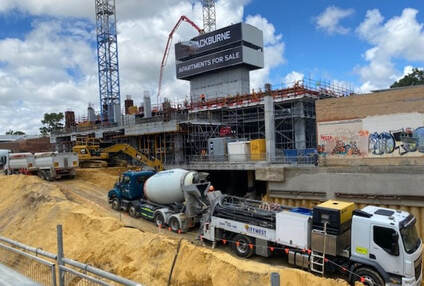|
The construction industry like any other industry has evolved during the years bringing innovative projects that will mark the future. Striving for change and transformation, this industry has introduced numerous tech solutions that focus on successful project delivery, and better collaboration and communication among managers, planners, and overall team members. In the article that follows, we will explain how construction management software solutions become the leading power in the industry, plus we will touch base with the top five apps to manage construction projects. What is Construction Management?The practice of planning, analyzing, monitoring, and overall managing construction projects from start to finish is called construction management. The goal of construction management is to deliver construction projects successfully on time and on budget. Being a complex practice, the best way to manage construction is to use construction management software. The Rise of Construction Management Software Solutions At its most basic, construction management software helps project planning and control through various operations such as estimation, budgeting, scheduling, resource coordination, and the effective use of a project’s time, cost, and quality. In brief, construction management software has been created to simplify the communication between project participants, increase transparency, share documents in a timely manner and develop techniques for resolving conflicts. Not long ago, construction project management consisted of documentation and methodology. Even though the focus of the construction industry has always been successful project delivery, there was limited use of project management software. This eventually produced a lot of documents and managing resources through them was hard and painstaking. However, as a result of technology expansion, planning and running construction projects became much more complex. Traditional methods and processes became unable to handle larger budgets, integrate multiple disciplines, manage the increased number of project participants, tighter schedules, stringent standards, etc. This was especially evident in the construction industry when companies started to waste millions of dollars every year due to a lack of project planning, organizing, and data transparency. Many managers faced cost-control boundaries, and inadequate communication, which lead to not having a common understanding of the project’s state at any given time. Under such circumstances, the daily efforts were not aligned with the project goals and tasks. Furthermore, the construction project was unable to be observed as a system due to the absence of efficient real-time reporting infrastructure and task management software. Companies fail to forecast and calculate labor productivity for the next period, which causes the unavailability of resources for equipment and materials. This mindset led to poor productivity and systematic issues making it impossible to reach a deadline while staying and passing quality standards. The need for implementing a managerial tool in construction management practices was inevitable. The main objective of this tool was to increase the efficiency and accountability of everyday tasks such as planning, designing, estimating, and developing effective communication between project participants. Top 5 Construction Project Management Software With the varying number of construction tools that exist, it can be confusing to decide which software best fits your needs. To help you find the best solution, we cover the top 5 construction management software: 1. Oracle Primavera P6 – The Standard for Planning and Scheduling With over 30 years of existence, Primavera P6 has been considered as a standard for project-intensive industries. Developed to help companies optimize resources, this software provides solutions to plan, build, and manage projects of all size by using real-time data. Robust, and easy-to-use, it the software integrates project and portfolio planning and delivery teams for planning, resourcing, risk mitigation, scheduling, and program management. Basic features:
Providing standards for planners, schedulers, and project controls, Primavera P6 has opened the market for new third-party tools to enhance its working environment by introducing XER files. There are many solutions that can be used along with P6 such as viewers that allow you to open .xer project schedules without a P6 license. Also, some of these XER viewers provide possibility for analyzing project schedules and generating reports. 2. Procore – Connect everyone on your project with one platform. Procore is one of the most popular cloud-based construction management platforms in the market that helps construction firms manage risks and build quality projects. This app has user-friendly interfaces. The platform includes features like bid management, daily logs, job site tracking, emails, meetings, project photos, punch lists, RFIs, scheduling, project specifications, submittals, timecards, and transmittals. Basic features:
Procore gives your team access to review, create, edit, and share project data with team members from various locations. Along with project management, Procore keeps team members together even if they are in different locations. 3. BIM 360 – Connect your workflows, teams, and data. As a cloud-based construction management tool, BIM 360 is developed to suit engineers, architects, designers, contractors, and other construction professionals. It is designed to help project members to make informed decisions, to speed up the delivery of their projects adhering to industry standards and project specifications. Basic features:
BIM 360 enables managers to have absolute control over their project and resolve issues faster because of dashboard coordination, design visualization, and racking real-time data. This software is part of the Autodesk Construction Cloud. 4. Powerproject Designed to support construction planners, Powerproject is one of the leading project management software solutions for construction. It is available as a standalone, enterprise, or cloud app that combines drag and drop functionalities with numerous features. Basic features:
5. Corecon – Cloud-Based Construction Software Designed to optimize collaboration and workflows, Corecon integrates stored information into a singular database to maximize project profitability. The software suite helps contractors better track leads and projects, as well as manage bids, contracts, and documentation. Moreover, Corecon provides various modules for estimating, procurement, vendor bid management, documentation, time tracking, and more to ease the work of all team members. Basic features:
Corecon can be accessed via browser or mobile so your team can make quick and informed decisions regardless of the physical location. Closing ThoughtsWhat is the best construction management software solution after all? All software solutions have similar features, but the same goal: to help construction managers deliver projects successfully. In this article, we reviewed 5 solutions that will narrow down your choices when choosing a construction management app. Each platform is suitable for construction projects of different sizes and data complexity, you only need to find the one that best suits your needs. About the Author Vivien Goldstrong is a Consultant, Author and Planning Manager with 22 years of experience and expertise in implementation and consultancy related to Oracle Primavera P6. You can read her blog here: https://projectschedulepro.com Other useful articles 10 reasons why a construction schedule/program is useful project scheduling - the relationship between time and cost requirements of a Project schedule Do you want to learn how to manage construction projects successfullyPaul Netscher has written several easy to read books for owners, contractors, construction managers, construction supervisors and foremen. They cover all aspects of construction management and are filled with tips and insights.
Visit to read more. The books are available in paper and ebook from most online stores including Amazon.
5 Comments
Every commercial building needs to have the latest upgrades to achieve exceptional functionality—one part of the building you need to keep an eye out for frequently is the roof. While you may think it’s merely a roof, you should remember that it protects the people inside your building. Moreover, modern roofs nowadays can do more than protect everyone inside from outside elements. If you are working in the construction industry, you need to know the different commercial roofs you can install for your projects. Each roof can provide specific advantages that will suit your needs, but they have the same role: to protect your building’s interior. It would be best if you knew about them to know what roof type the contractors should use for the construction project. 1. Metal Roofing The first roof type that you may have seen everywhere is metal roofing. Metal roofing is a popular choice for residential and commercial buildings because they are affordable and relatively easy to install by roofing contractors. However, metal roofing has variations because manufacturers mix other metals to create another type. Here are several examples of metal materials for roofing:
While using metal roofing is cheap, you should know that it’s susceptible to rust, especially when exposed to prolonged weather elements such as rain, snow, and heat. But what makes metal roofing the best option for some commercial building owners is its attractive, finished look. Another benefit of it is that it’s fire-resistant, so you won’t have to fret about your roof catching on fire anytime soon. If you want a durable roof than most traditional commercial roofing choices, you should choose metal roofing. 2. Membrane Roofing Another commercial roofing type you might want to install is membrane roofing, also known as flat roofing. You can find that most commercial and industrial buildings have membrane roofing because of its many benefits. It comprises multiple layers of different roofing materials, but nowadays, you can find single-ply membranes. The reason most buildings have membrane roofing is that it’s relatively easy to install, ensuring you get to enjoy your new roofing at a moment’s notice. Another great thing about it is the lost-cost maintenance. For other roofing options, you might need to spend extra dollars to get it fixed or maintained. 3. Modified Bitumen (MB) Roofing The modified bitumen roofing is closely related to the Built-Up Roof (BUR), and it is asphalt-based roofing material. Roofing contractors would specifically install it for commercial buildings with a flat roof surface. In most cases, roofing contractors install MB roofing systems to rooftops as a two-ply system, stuck to the roofing deck for maximal protection and stability. Like with the membrane roofing, you only need minimal maintenance for the MB roofing, and you can easily have maintenance personnel clean by washing. They provide maximum tensile strength than other flat roof types that sustain heavy foot traffic. If you have people visiting and walking on the roof most of the time, you should choose MB roofing as your roofing material. During maintenance season, you should install a roof hatch on your building to provide easy access to the roof. Most facilities install it because roofing contractors and maintenance personnel don’t need to prop a ladder to the building’s side. All they need is to go to the top floor, climb up the ladder, and go through the roof hatch. If you want to learn more about it, visit Best Roof Hatches’ website today! Author Bio: Best Roof Hatches is a trusted supplier for your roof hatches needs or for any commercial construction roofing project. For more inquiries or more help, visit our website. Do you want to learn how to manage construction projects successfullyPaul Netscher has written several easy to read books for owners, contractors, construction managers, construction supervisors and foremen. They cover all aspects of construction management and are filled with tips and insights.
Visit to read more. The books are available in paper and ebook from most online stores including Amazon. |
Archives
June 2024
Note: We welcome genuine comments, especially comments that add additional information to the subject matter in the article. We however reserve the right to remove inappropriate comments, which includes comments that have nothing to do with the subject, comments that include inappropriate language, and comments that are an advertisement for a product or company, or which include an advertising link. Comments must be in English. We will not enter into discussion on why a particular comment was removed.
CategoriesCopyright 2016 - The attached articles cannot be reproduced for commercial purposes without the consent of the author.
The opinions expressed in the attached articles are those of the writer. It should be noted that projects are varied and different laws and restrictions apply which depend on the location of the contractor and the project. It's important that the reader uses the supplied information taking cognisance of their particular circumstances. The writer assumes no responsibility or liability for any loss of any kind arising from the reader using the information or advice contained herein. "I have what I consider some of the best books on construction management."
Books are available from: Amazon.com Amazon.co.uk takealot.com kalahari.com Amazon.in Amazon.de Amazon.fr Amazon.it Amazon.com.au Powell's Fishpond uread bokus Amazon.ca Amazon.es Other retail stores Available in paperback or on Kindle "28 YEARS OF CONSTRUCTION PROJECT MANAGEMENT EXPERIENCE, DEVELOPING SUCCESSFUL CONSTRUCTION PROJECT MANAGERS AND BUILDING SUCCESSFUL CONSTRUCTION COMPANIES"
|









 RSS Feed
RSS Feed




